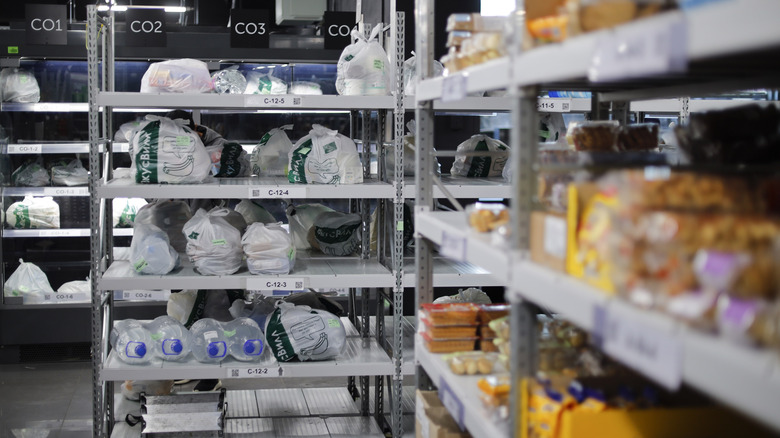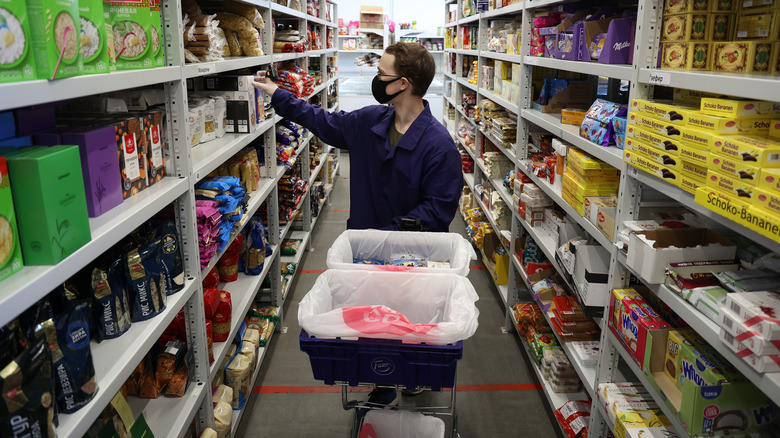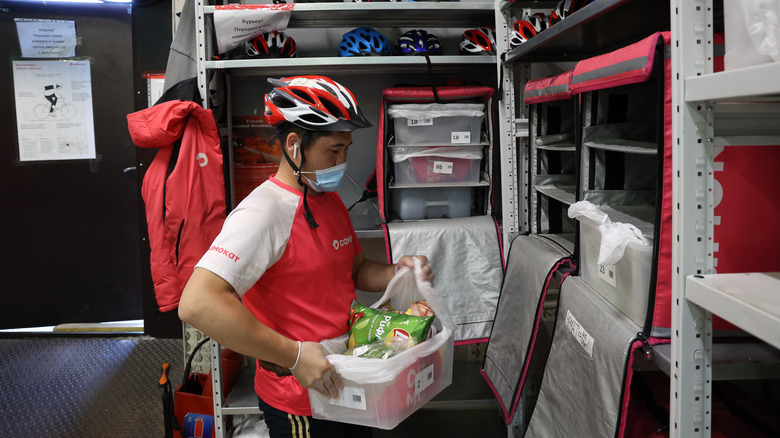Dark Stores Are The Grocery Markets That You'll Never Step Into
Dark stores are warehouse-style fulfillment centers for online grocery delivery that are closed to shoppers. They stock a myriad of grocery items, and trained workers know exactly where to find them, load them into carts, and deliver them to your address. If that sounds like a kind of futuristic idea, the concept has been around for a while.
A 2019 report by Supermarket News found that while less than 25% of U.S. consumers purchased groceries online in 2018, nearly 40% did by the following year. The U.S. e-grocery sector was booming in 2020 as COVID-19 created a grocery accessibility problem that dark stores stepped up to solve. The online grocery industry saw $90 billion in sales in 2021 alone, according to Invent Analytics. Now, like many of the emergency services established during the pandemic, the surged popularity of dark stores is largely a temporary solution that just sort of stuck around.
Dark stores are a realization of optimized efficiency that'd make Henry Ford roll over in his grave, as well as an innovative option for consumers with mobility-related disabilities or anybody who is consistently short on time (we see you, working parents). From an economic standpoint, businesses don't have to worry about allowing for competitive brand shelving space, maintaining wide aisles, or maintaining visually appealing displays. These warehouse-style setups also facilitate increased accuracy in inventory management and greater order fulfillment capacity, and they also don't require the physical buildings to be located in accessible city centers, all of which saves money.
Drawbacks and industry implications
For all its efficiency, the dark store format isn't without some major drawbacks, primarily at the intersection of economy and sociology. Hyper-fast delivery feeds the public's increasingly insatiable appetite for convenience, not to mention further enabling isolation — a budding social (or rather, antisocial) epidemic that has bloomed like a mushroom cloud since the pandemic. In 2023, U.S. Surgeon General Vivek Murthy released a report titled "Our Epidemic of Loneliness and Isolation," which considered the lingering feeling of social isolation millions of Americans are experiencing to be a national health emergency. The argument could be made that remote work, online schooling, and now dark stores are moving people further away from fundamental human experiences — including hunter-gathering at the grocery store.
Dark stores also carry more radical, potentially darker (sardonic pun intended) industry implications. Food Logistics calls it "a form of cannibalization" that will accelerate profit erosion to the point that self-service grocery stores could one day be rendered economically unrealistic, reshaping the retail scene as we know it. The prediction might be a dystopian long shot, but the human cost of dark stores' low-cost business model is already playing out in real-time. As Shelly Stewart, director of the Future of Work Initiative at the Aspen Institute, notes via The Guardian, app-based fulfillment centers inherently consider employees "not as a source of profit that keeps the company going, but just another expense on a spreadsheet to minimize the costs of and reduce when times are slow."
A relatively bright future outlook for dark grocery stores
Looking forward, contemporary grocery shoppers can reasonably expect dark stores to stick around for a while. In early 2022, there were 115 dark stores in New York City's five boroughs, per a study by BetaNYC. Gorillas, a prominent dark store delivery chain, has expanded to New York, Boston, and Chicago, and high-traffic competitors like Gopuff have emerged alongside.
Shifting order-fulfillment models have become crucial to many modern grocery retailers, as online sales increasingly dominate the market and stores must be able to accommodate them to remain financially viable. In this way, dark stores are also a hugely convenient model for grocery store employees, who don't have to navigate around in-store shoppers to fulfill online orders. According to a report by market analytics platform Incisiv and The Food Industry Association, 69% of all grocery sales in 2023 were "digitally influenced." It's a staggering figure, but per the report, an estimated $23 billion in sales was lost due to customers ordering items that were unavailable and couldn't be substituted by another product, leading 89% of grocers to agree that "optimizing fulfillment is key to improving digital profitability." For now, it seems safe to predict that consumers will continue ordering their groceries online, but whether or not dedicated dark stores will occupy a larger space in the retail scene than they do now remains to be seen.


